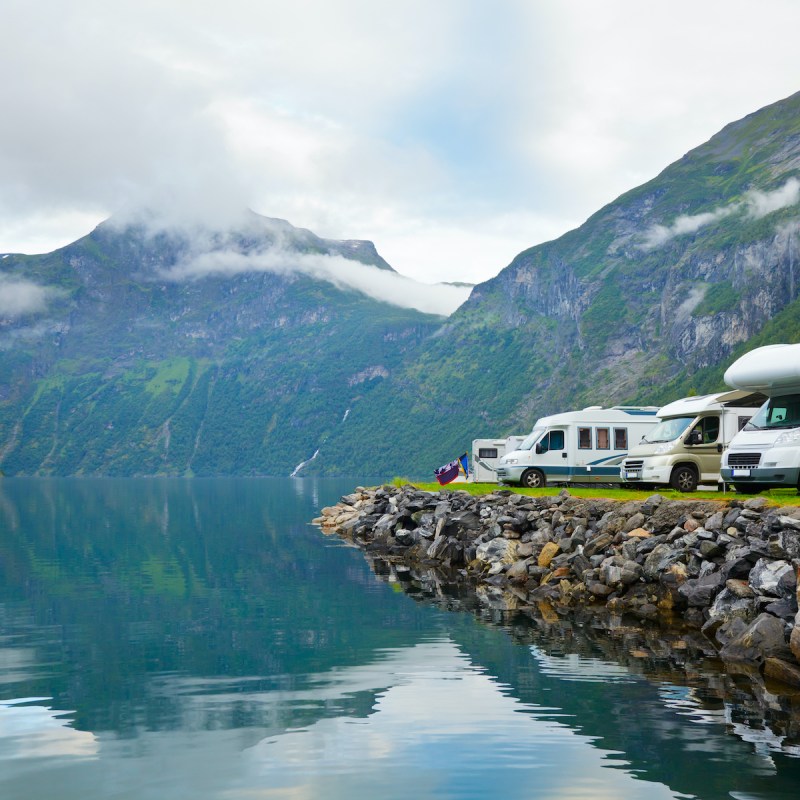
Traveling in an RV is an extremely popular activity among retirees. Some retirees have gone a step further and made the RV their full-time retirement home. I did this and have met many others in campgrounds around the country who also consider themselves “full-timers.”
Videos by TravelAwaits
During the pandemic, I elected to get into an apartment. I realized there are big differences between a “sticks and bricks” house and living in an RV. I’m happy to be back on the road and RV living again. Knowing the differences might help you make an informed decision.
1. How To Live Without A Home Base
As I traveled in my RV at the beginning of the pandemic, I started getting cancelation notices for park reservations. As the pandemic got worse, my options narrowed. I found a couple of places to stay for several months, but it was unsettling. I was at the mercy of government parks and private parks that didn’t know how to cope with the conditions. I wanted to be in a location with friends and family nearby. Many full-time RV folks realized they were vulnerable without a parking space they owned or a long-term commitment with an RV park.
I’ve come across people that have since bought a property expressly zoned for RV living with utilities pre-installed. Others have bought in parks that allow full-time living for 5 or 6 months a year and then they travel the rest of the year. Finally, some people buy a small house with an adjacent parking pad in an RV community so they may have a “house” and park their RV when they aren’t traveling. I have spent more time being a camp host at state parks. Having a home base or not is probably one of the most important differences between full-time RV life and conventional house or apartment living.
2. How To Radically Downsize My Life
People I talk to are amazed that I fit my entire life into 200 square feet. I spent 6 years downsizing because moving around the country became too difficult with all my “stuff.” By the time I decided to retire as an RV traveler, I thought I was down to the bare minimum. Since then, many things that came into the RV have left the RV. I realized I just don’t need them.
I made compromises to achieve this small footprint. There is no room for extra dishes or decorations for all seasons. I let go of sentimental attachments to a lot of things. I have my memories and don’t need to possess all of them. I have one plastic tub under the bed that holds memorabilia, decorations, and favorite items. I’m amazed that I have more space than stuff at this point.
I’ve talked to many people that gave up the house and moved into the RV but put most of their stuff in storage. They assume they’ll get off the road at some point and want to put their old life back together. I can’t imagine ever doing that as I have grown and changed so much in this journey. Deciding what to do with all your stuff is a big decision and difference in choosing full-time RV living.
3. How To Foster A Travel Mindset Rather Than A Vacation Mindset
Traveling is probably the most popular reason people choose full-time RV living. People want to see new places and experience different parts of the country. But traveling constantly can wear you down and the prospect of a permanent vacation can be daunting. But there is a difference between traveling for vacation and traveling as part of your lifestyle.
Living in an RV is not necessarily a permanent vacation. When you travel on vacation, you are likely to splurge for dinners out, buy souvenirs, and go on excursions. You travel differently in RV living. You cook at “home” and do your regular chores like laundry and cleaning, even though you are parked inside a national park. That distinction can be jarring because it is not how we normally think of travel.
A travel mindset for full-time RV living is about being in natural settings and making that your lifestyle. I take excursions now and then. One of my favorite trips was a whale-watching boat trip in the San Juan Islands. But people who take a weekend trip or even a 2-week vacation may never experience the intimate day-to-day interaction that I have come to expect as a full-time traveler. You are your own tour guide. Expect the unexpected every day.
4. RV Living Isn’t About Cutting Costs
RV living is not necessarily cheaper than living in a house or apartment. Yes, my monthly campground fees are less than rent or mortgage and my utilities are mostly free. But I pay a lot for a mobile hotspot and unlimited data. I also added solar to my RV to broaden where I can comfortably stay. That was a large investment. Others choose to use a gas generator.
My RV has insurance, a road hazard plan, and an extended warranty. I don’t think it’s much different than homeowner or renter insurance. Add a state license tag and registration for the RV too. The biggest difference is the cost of gas to travel, which these days is a major expenditure. I’ve chosen to stay longer at places and stay in one part of the country for the time being.
The most significant unexpected cost for most full-time RVers is maintenance. Time and money will be spent keeping your RV running. Maintenance requires daily, weekly, and annual tasks to tighten screws, check connections, maintain plumbing and batteries, and replace parts. I have to have a mobile repair person come out once or twice a year.
My home bumps down the highway at 60 miles per hour, causing things to break and weaken. I lost an awning in the winds of Amarillo, Texas. Home maintenance comes with the territory anywhere you live, but RVs require constant attention and money.
If you have extensive repairs like bodywork or electrical problems, your RV will go into the shop. That means finding somewhere to live temporarily; possibly for 3 or 4 months for significant repairs. I had body work done on my aluminum trailer and luckily had a friend with a spare room that didn’t mind an extended houseguest. Plan on this eventuality.
5. Appreciation For The Amazing Beauty At My Doorstep
Living in an RV means there is always something to enjoy outside my door. Every morning I have my coffee overlooking a beautiful landscape. I never tire of this opportunity. I choose places that have interesting vistas, wildlife, and foliage. Sometimes I get two out of three, but it’s more than I had in a regular house or apartment.
During the pandemic, I had to trek to an elevator to get to a parking lot and drive to a scenic location. In my RV life, my views are right outside my door, three steps away. I’ve stayed in a rainforest, on riverbanks, in mountains, and on the Gulf of Mexico.
I enjoy coming across an unexpected town or point of interest that wasn’t on my itinerary. I made a change in my route to go to a national historic site in Pipestone, Minnesota, and then took some back roads until I found a little town in Iowa with a city RV park where I spent the night next to a river. It was unplanned and a lot of fun.
6. How To Find Community
One of the biggest differences between retiring in place and retiring into full-time traveling is having community. When you retire as a traveler, you will no longer experience your in-person connections at church or the grocery store or have permanent next-door neighbors. I’ve traded in backyard barbecues and hanging at the coffee shop with meeting neighbors in campgrounds, sitting around a campfire, and doing happy hours in camp chairs. Some people find the impermanence of these connections to be disconcerting, but I travel to visit friends and family.
Another source of community for me is my RV clubs. I attend rallies and events to meet up with my RV friends that I otherwise can only visit online. Most manufacturers have clubs for those who own that brand. Airstream has an extensive collection of state chapters and intra-clubs for specialized interests. I belong to clubs for single women, a Pacific Northwest group, and one for wine and whisky aficionados. I’ve made new friends and had fun with other enthusiasts.
7. How To Invest In My Sense Of Freedom And Adventure Daily
The biggest difference for me in opting for retirement RV travel is the freedom I have from everyday life. I never know what I’ll find on the road, what interesting place I’ll come upon, or what fantastic view is just around the corner. My schedule is dictated by my wanderlust and the weather.
Many people have freedom and adventure in their retirement and live conventionally. There is no right answer. But the sights, the new roads to travel, and the new people to meet are awesome reasons to hit the road.
RV travel retirement is all about the journey because there is no destination. Enjoy retirement wherever you choose to live.
